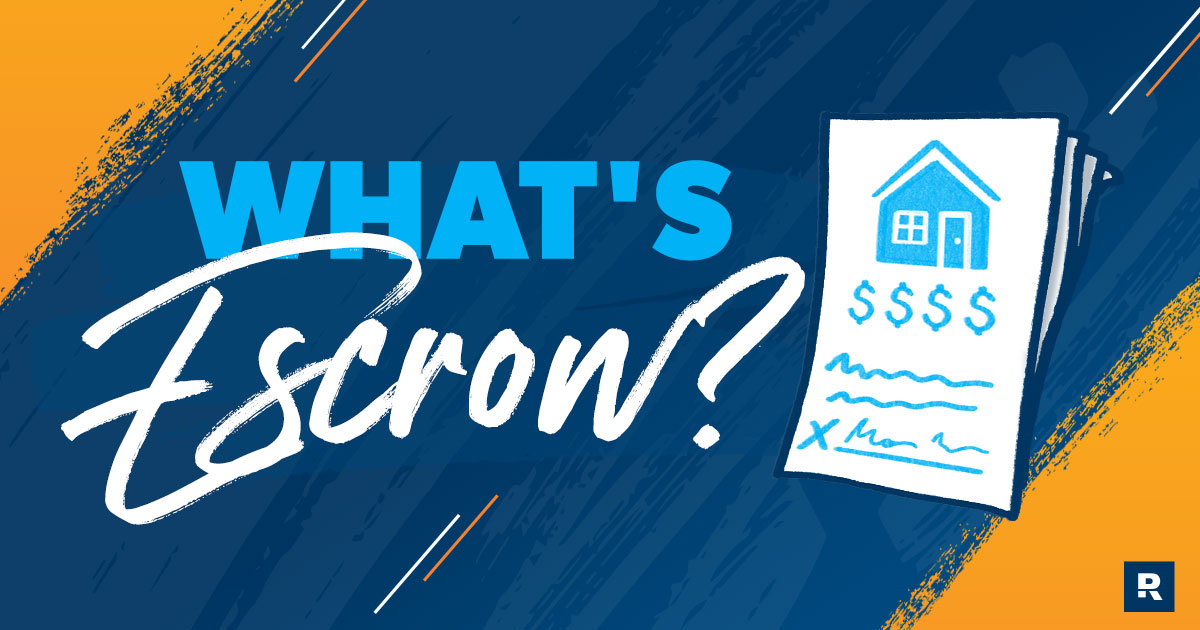What Is an Escrow Account and How Does It Work?
8 Min Read | Dec 12, 2024

Escrow sounds like a made-up word someone might use to cheat in Scrabble. But we promise, it’s real! So let your opponent score those points.
You never really hear about escrow until you’re buying a house. Maybe you’ve even seen a “For Sale” sign with “In Escrow” at the top and thought, What the heck does that mean?
Let’s take a closer look at escrow to find out what it is and explain why it’s important when you’re buying or selling a home.
What Is Escrow?
Escrow refers to a neutral third party that is put in charge of holding something of value—usually cash—until a transaction between a buyer and seller is complete. The money is kept safe in an escrow bank account managed only by that third party.
Think of escrow kind of like a referee in a football game. They take no sides and make sure everyone is playing by the rules until the game is over. But the name of the game here is real estate.
If you’re a home buyer or seller, being in escrow means different things:
- As a buyer, you agree to pay a percentage of the home price into escrow for safekeeping.
- As a seller, you agree to take the house off the market while it’s in escrow and make it available for inspections.
The main job of escrow is to ensure a fair and smooth real estate deal from beginning to end. You can use escrow accounts for other transactions like online shopping purchases (where the escrow service holds onto the money from the buyer until confirmation that the goods have been received). But right now we’re only dealing with escrow in real estate.
Types of Escrow Accounts
Remember, you’ll mainly use escrow as a money holder while making the biggest purchase in your lifetime—a house! But you’ll also use it after you close on your home too. Let’s unpack both scenarios.
1. Escrow Account for Home Buying
First, you’ll probably use an escrow bank account when you find your dream home and the seller accepts your offer. Here’s how that works:
- Agree on an escrow agent. Your real estate agent will probably recommend an escrow agent who both you and the seller agree on. This escrow agent could be a professional title agent, a real estate lawyer or a mortgage loan officer.
- Deposit earnest money. You’ll be asked to put down an earnest money deposit—a small percentage of the home sale price, which you’ll make payable to the escrow provider. They’ll hang on to your money until the sale is final.
Earnest money acts kind of like a security deposit that shows the seller you’re serious about buying their house. In return, they agree to take the home off the market, make it available for inspections, and carry out any agreed-upon repairs or provide disclosures to help see the sale through.
When you finally get to closing day, the earnest money will be subtracted from the amount you owe the seller and put toward closing costs.
Find expert agents to help you buy your home.
If for any reason the seller doesn’t make an agreed-upon repair by the closing date, then money can be held from them in escrow to cover the cost to you. And if the deal falls through? Don’t worry: You’ll get your earnest money back minus a small cancellation fee.
2. Escrow Account for Mortgage Payments
Okay, even after you purchase a house, most mortgage lenders will request you have an ongoing escrow account for taxes and insurance.
This escrow account will be in your name, containing money paid in by you, and accessed by your mortgage lender. Here’s how it works:
- Set up account. Your mortgage company sets up your escrow account after you’ve closed on your home.
- Make payments. Then, you pay into it every month as part of your monthly mortgage payment.
A homeowner escrow account isn’t the most exciting thing in the world because its only purpose is to give you one place to pay for expenses like home insurance and property taxes. But at least it means you won’t have to worry about paying for those separately on your own.
Also, you’re usually required to keep two months’ worth of escrow expenses in your account at all times. That’s to make sure you’re covered if your tax or insurance bills increase unexpectedly.
How Does an Escrow Account Work?
Imagine it’s closing day for your house purchase. Yay! The champagne is on ice, and you’re signing the paperwork at your real estate attorney’s office. This is when you’ll get the breakdown of your monthly payment to the mortgage lender. Gulp!
To understand what’s included in your monthly mortgage payment, think of the acronym “PITI.” Here’s what that stands for:
- Principal
- Interest
- Taxes
- Insurance
Taxes and insurance are the parts of your monthly payment that will go into your escrow account and be held by your lender to pay property taxes and home insurance each year.
The reason mortgage lenders want you to have an escrow account is so they don’t have to worry about you falling behind on these important expenses. In the end, you don’t want to lose your house, and they don’t want to lose the money they’ve just loaned to you!
And like we pointed out, an escrow account is also helpful to you because you don’t need to stress about making sure your property taxes and home insurance are paid on time each year. The escrow account does that for you!
How Is Escrow Calculated?
Calculating escrow is as straightforward as taking the total amount of your property taxes and home insurance bills for one year and dividing that number by 12 monthly payments.
For example, let’s pretend your property tax rate is 1% of your $300,000 house (that’s $3,000) and your home insurance policy costs $2,300 per year. That means you’ll pay escrow $250 for taxes and $192 for insurance each month.
That’s a total of nearly $442 going toward escrow each month. Keep in mind, how much you pay will probably change every year depending on the rise and fall of your property value and the economy.
Want More Expert Real Estate Advice?
Sign up for our newsletter! It’s packed with practical tips to help you tackle the housing market and buy or sell your home with confidence—delivered straight to your inbox twice a month!
How Often Do I Pay Into Escrow?
You’ll pay into your escrow account every month for as long as you have a mortgage. Remember, part of your monthly mortgage payment (property taxes and home insurance) is paid to your escrow account.
When you finally make that last mortgage payment and officially pay off your house, you’ll still need to pay for property taxes and home insurance. But since the mortgage is gone, you’ll make those payments directly to your local government and insurance provider on your own.
What Happens to My Escrow Account When I Sell My Home?
Don’t worry: If you’re selling your home, your mortgage lender will refund any money in your escrow account within 20 business days after the sale of the property.1 If you’re selling your home to upsize to a bigger pad, it’s wise to use your escrow funds from your old mortgage to go toward the cost of your new place.
Is Escrow Good or Bad?
There’s nothing wrong with having an escrow account. It’s basically like having a forced savings account for your taxes and insurance bills. That way, you won’t have to worry about forgetting to budget for those expenses. Your lender will take care of them for you and pay them on time.
The only real downside to escrow is if you prefer handling taxes and insurance payments on your own. You lose a little control over that because your money will be tied up in the escrow account and managed by your lender.
Can I Avoid Having an Escrow Account?
You usually can’t avoid an escrow account because it’s mandatory when you take out a mortgage with most lenders. And if there’s a loophole allowing you to opt out of having an escrow account, there are a bunch of hoops to jump through.
Every lender has different rules, but you’ll probably need to have your mortgage for at least a year—and have no late payments during that time. Then you’ll have to give notice in writing that you want to opt out of escrow. And each year, you’ll have to provide written proof that you’ve paid your home insurance and property taxes on time.
For most people, it’s not worth the hassle! Most folks are happy to have an escrow account that takes care of all of that.
Work With a Top Real Estate Agent
Dealing with escrow can be complicated. But not when you’re working with a real estate agent who knows the ins and outs of it. For a fast and easy way to find the best agents near you, try our RamseyTrusted® program.
The agents in our network have made it through our rigorous vetting process and have earned our seal of approval for being the best real estate agents in the biz and are also committed to sharing our values.
Did you find this article helpful? Share it!

We Hear You!
We’re considering adding the ability to save articles to your Ramsey account.




